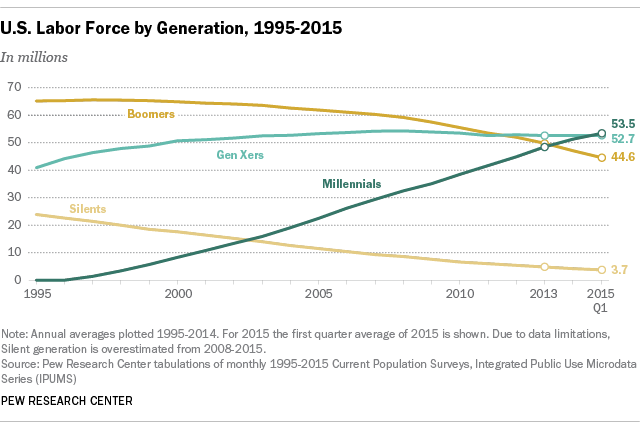“I would never hire a millennial.” While the sentiment may be popular in some TPA leadership circles, these are dangerous words. The TPA industry needs to hire the next generation of workers to keep businesses thriving. Currently the largest demographic group in the country, millennials are coming into the workforce at a time when other generations have plateaued or are declining. So, why should a millennial make it to the top of your candidate list?
I started my career at PensionPro as a help center assistant at the age of 26. Armed with a journalism degree and just enough knowledge about the pension industry to ask my new boss what I needed to do with my prior 401(k), I was not the ideal candidate. Within three years I have worked to become Director of Client Engagement, responsible for PensionPro’s white glove customer service, sales, and training.
There are a few catalysts to help invest in a youthful workforce and none more immediate than technology. Working with PensionPro software proved to be the great equalizer because I could immediately compete with seasoned TPA professionals. The processes that took years to learn had been replaced with step by step instructions and in many cases, automation. So, if you have invested in technology, look for the following three qualities in millennials to help you build your next generation workforce:
Passion: The headlines say we are whiny, over-sensitive adults. There is no doubt millennials champion tolerance, albeit sometimes a bit dramatically. However, inside of any business, this fiery passion is the fuel that I, and my colleagues, use to build better businesses. As a TPA firm, you’ll be looking for smart, eager business men and women to enter your workforce. Recent data from the National Center for Education Statistics reveal that those entering the workforce with a business degree account for about 20 percent of graduating students. The Pew Research Center also found that 4 out of 10 millennial (ages 25-29) workers had obtained a 4-year degree in 2016. These numbers support the idea that businesses are benefiting from 1) more engaged students and 2) a workforce of adults who are versatile. It is true that not every first job is the perfect fit or one we intend to stay in long-term. However, millennials are entering an economy scarred by the recession, an economy that they want to thrive in. There’s a level of pressure to a millennial’s first job that didn’t necessarily apply to the generation before us.
Adaptability: We see firms struggle with retaining good employees and trying to hire talented staff. Millennials may be the answer. Experienced folks expect a high salary, flexibility, location preferences, and set hours. They can be rigid in their job expectation based upon prior experience – do these expectations even align with your process and goals? If good standard operating procedures are in place, onboarding a person with little to no experience isn’t overly challenging. Instead of having to rewire their brains to align with your methods, millennials learn your workplace culture from scratch and more easily align with your processes and workflow. These next-gen workers are not only teachable, they bring valuable skills to the workplace – technological skills. We grew up using computers, videos, and applications. Do you remember what your general education requirements were in college? For millennials, those “foundations” include classes in Excel, programming, and social media. When you are looking to hire a replacement for a plan administrator, would you want someone who strictly handles plans, or would you like to hire someone who handles plans and can maintain your webpage, update or create your social media presence, and help you troubleshoot computer issues?
Career-Driven: With the rise of technology and the reliance on the internet, Generation Y grew up entrenched with social media and constant branding. Advertising has reached us almost every hour of daily life, from podcasts to streaming music services. We experience life differently. Earning a college degree, traveling abroad, and owning the latest cell phone have become rites of passage. Constant exposure means every millennial is running in a race to have the best life experience, and that means excelling in our careers. While it is true we can be glued to technology, we apply that “always on” connection to our work lives. A workweek is not 9-5 Monday through Friday, it is whenever we are needed, 7 days a week. When millennials feel valued in a position, they are loyal and motivated. Giving young people the opportunity and support to succeed will benefit both the employer and the employee in the long run. When a company is willing to invest its time and trust in us, we too, want to invest our time and effort into making the venture successful.
It’s no secret that our industry is changing — be it fiduciary rules, going paperless, robo-advisers and all things in between. If the goal is to maintain a thriving business, young leaders will be key. So, as you gear up to hire the next generation of your company, think about this question: Is experience worth hiring someone that puts the majority of your staff in the “retiring in the next 10 years” pool? If you’re looking to grow, give my generation a chance. Let’s face it, if websites, Facebook, and LinkedIn are not in your wheelhouse, chances are you might be able to use some help in your firm’s marketing efforts. We are more than the stereotypes make us out to be, and at 75 million strong, this generation is the future of business. Why not get a head start?
TRIVIA:
How many millennials work at PensionPro?
Average Age: 33.5
Millennials employed: 9
Millennials are part of Generation Y, also known as Generation Next-ers.



